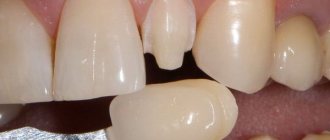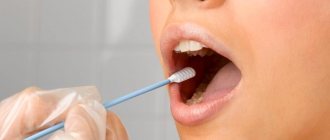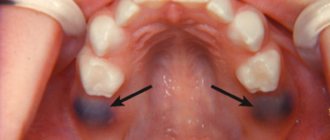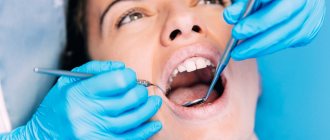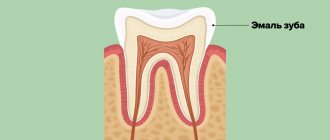The main cause of dental caries is the activity of bacteria in the oral cavity. But there are also a number of additional factors that can contribute to the development of this disease. One of these factors is saliva. How the pH of human saliva affects dental health will be discussed in this article.
In this article
- Why does caries develop?
- What is the role of saliva in maintaining oral health?
- What happens when there is insufficient saliva production?
- How does saliva pH affect teeth?
- Prevention of salivary disorders and dental caries
- Conclusion
Why does caries develop?
Scientists are still studying the mechanisms of the development of caries - one of the most common diseases on the planet. They agree that caries is caused by microorganisms living in the oral cavity, in the presence of associated factors. These factors include carbohydrate nutrition, poor oral hygiene, and the qualitative and quantitative composition of saliva.
How does the carious process develop and why do cavities form in teeth? Contrary to popular belief, microbes do not chew holes in teeth; caries develops differently. Cariogenic bacteria (one of the species is Streptococcus mutans) form colonies on the surface of teeth, collecting in a biofilm - dental plaque. These bacteria “love” foods rich in carbohydrates and ferment the sugars contained in them. The products of carbohydrate processing by bacteria are organic acids. So they harm our teeth and contribute to the development of caries.
Acids produced by bacteria disrupt the normal structure of the enamel, promote its demineralization, penetrate into the deep tissues of the tooth and continue to destroy it from the inside. The more microbes in the mouth, the more carbohydrates they receive, the higher the acidity on the surface of the teeth and the more active the process of their destruction occurs.
References
- Belaya, Zh.E., Rozhinskaya, L.Ya., Melnichenko, G.A. Modern view on screening and diagnosis of endogenous hypercortisolism. Problems of endocrinology, 2012. - V. 4. - P. 35-41.
- Federal clinical guidelines. Itsenko-Cushing's disease: clinical picture, diagnosis, differential diagnosis, treatment methods. Russian Association of Endocrinologists, 2014.
- Wilson, D. McGraw-Hill Manual of Laboratory and Diagnostic Tests 1st Ed Normal, 2007.
- Dorn, L., Lucke, J., Loucks, T. et al. Salivary cortisol reflects serum cortisol: analysis of circadian profiles. Ann Clin Biochem, 2007. - Vol. 44(3). — P. 281-84.
- Nicolson, N. In L. J. Luecken and L. C. Gallo. Measurement of Cortisol. In: Handbook of Psychological Research Methods in Health Psychology. Sage Publications, 2008, pp. 37–74.
What is the role of saliva in maintaining oral health?
Saliva is the biological fluid of our body that is produced by the salivary glands. Constantly present in the oral cavity, saliva takes part in the digestive processes, nourishes tissues, provides natural cleaning of the oral cavity, and protects teeth and mucous membranes from bacterial exposure. All natural processes that occur with our teeth are carried out in interaction with this biofluid. Saliva ensures the normal functioning of all tissues and organs of the oral cavity; in particular, the important role of saliva in maintaining the mineral composition of tooth enamel has been proven.
In addition to water, saliva contains phosphates, calcium salts, fluorides, sodium compounds and other substances that help strengthen and maintain the health of tooth enamel. Essentially, salivary fluid is a solution supersaturated with calcium and phosphate salts. Due to this composition, saliva qualitatively mineralizes teeth. Medical research has proven that during teething, enamel matures primarily due to the active intake of calcium and phosphorus ions from saliva. It also maintains and, if necessary, restores the correct balance of minerals in already erupted teeth.
In addition to its mineralizing function, the protective role of saliva has been proven. It contains lysozyme and some other substances with bactericidal and bacteriostatic effects. Thanks to this, saliva neutralizes the action of pathogenic microorganisms and prevents the development of infections of the teeth and oral cavity. And finally, saliva performs a cleansing function, washing away food debris and germs.
Thus, normal quality and quantity of saliva is the most important condition for healthy teeth and oral cavity. Any violations of its quantitative or qualitative composition can provoke the development of caries, diseases of the mucous membranes and periodontium.
Maintaining digestion and treating enzyme deficiencies
If you have problems with digestion, enzyme preparations (more often called drugs to improve digestion) can help, the main task of which is to compensate for the lack of the body’s own enzymes. It’s not for nothing that this therapy is called “enzyme replacement”. It is critical that the enzyme preparation “mimics” the physiological process as closely as possible.
Today, there are various drugs to improve digestion. How to navigate the variety of means and make the right choice?
An effective enzyme preparation must meet the following criteria5,6:
- have an optimal particle size
- do not break down in the stomach
- quickly activate in the intestines
The drug Creon® meets all these requirements.
To learn more
1) Today, pancreatin minimicrospheres, which are contained only in the drug Creon®5,7, are recognized as the optimal particles. The invention of minimicrospheres was the result of many years of work to improve the effectiveness of enzyme preparations, which left far behind drugs in the form of tablets and capsules with other types of particles inside: pellets, mini-tablets, etc. In addition, Creon® minimicrospheres are produced using patented technology, which prevents other manufacturers from reproducing the same release form.
2) Creon® minimicrospheres are enclosed in a capsule that protects them from the destructive effects of the stomach. But that is not all. Each particle is covered with an acid-resistant coating in order to “reach” the intestines, where its work is necessary, completely intact. At the same time, some other encapsulated drugs can lose up to 30% of their activity6.
3) Creon® begins to work within 15 minutes after entering the intestines, improving digestion and thereby eliminating heaviness and discomfort after eating6.
Creon® has several dosages, including 10,000 IU of lipase - the minimum required dose of lipase to improve digestion in case of dietary errors, eating heavy foods and overeating. To obtain the effect, Creon®10000, like any enzyme preparation, must be taken with every meal - during breakfast, lunch and dinner.
What happens when there is insufficient saliva production?
According to statistics, every fifth adult is diagnosed with xerostomia, or dry mouth. This condition is caused by the fact that a person has reduced or completely absent saliva production. Since this biofluid performs a number of important functions, with xerostomia negative changes occur in the oral cavity:
- discomfort occurs;
- the level of hygiene of teeth and gums decreases;
- Due to a lack of saliva, the pH of the oral cavity decreases, microbes actively multiply in the mouth, and dental caries may begin to develop.
How does saliva pH affect teeth?
One of the protective elements of saliva is the so-called buffer system. Its task is to neutralize the negative effects of acids entering the oral cavity. Buffer systems maintain a normal pH level in the oral cavity, providing protection against acid-base influences. It is the buffer systems of saliva that influence the restoration of the pH of the oral cavity within minutes after eating.
If the pH of saliva is disturbed, buffer systems do not cope with their task and cannot neutralize acids. This leads to the fact that tooth enamel quickly loses mineral substances, caries develops, as well as non-carious lesions of dental tissues.
Dietary habits and poor oral hygiene can affect changes in the pH level of saliva, and therefore play a role in the development of caries. Some diseases and conditions also affect the process of salivation. For example, with Sjogren's syndrome and diabetes, saliva production decreases, dry mouth and related problems occur. In cases of dysfunction of the thyroid gland, rheumatoid arthritis, and some mental illnesses, saliva does not perform its mineralizing function, that is, it does not provide tooth enamel with a sufficient amount of calcium and phosphorus ions. This explains the fact why, with concomitant diseases, caries in patients is much more common and can develop at a faster pace.
Research also shows that the normal pH level of saliva is different for children and adults. In children, the enamel begins to lose minerals at higher pH levels, and the acid-base balance in the oral cavity is restored more slowly due to the smaller volume of saliva compared to adults. Therefore, caries in childhood develops much faster.
Pancreatic enzymes - types and functions
It's time to learn what enzymes are and how they affect digestion. Pancreatic enzymes are protein complexes or catalysts whose main task is to break down nutrients into simple, easily digestible compounds. Thus, the body easily absorbs all the necessary elements and vitamins.
With a lack of pancreatic enzymes, food is not digested fully, not all beneficial substances are absorbed, which affects the condition of the entire body1.
What enzymes does the pancreas produce and what are their functions?
The pancreas produces several types of enzymes, each of which does its own thing1,2.
- Proteases – break down proteins into amino acids;
- Lipases – decompose fats into fatty acids;
- Amylases - break down sugar (carbohydrates) and starch.
The amount of enzymes released is measured in units. The pancreas can produce up to 2 million units of enzymes per day. In this case, it is customary to take lipase units as a unit of measurement, since fats are the most difficult food components to digest8.
Now let’s look at the principle of how enzymes work, and to do this we’ll have to remember about the digestion process as a whole. The main task of digestion is to absorb all the nutrients that come with food. To do this, food must be disassembled into “bricks”. The process begins literally in the mouth, already during chewing, under the influence of saliva. Next, the food enters the stomach - the kingdom of gastric juice and the enzyme pepsin, where it acquires a mushy form and then, already prepared nutrients, enter the intestines in small portions.
It is in the intestines that the main stage of digestion occurs. Let us examine this stage in more detail, since it is directly related to pancreatic enzymes8.
After food enters the duodenum (the first section of the intestine after the stomach), it begins to be affected by the secretion (juice) of the pancreas, which contains digestive enzymes. At rest, the pancreas does not produce enzymes, but is in “standby mode.” But it is enough to catch the alluring smell of food or see a tasty dish, as the brain instantly gives the command to start working, and the pancreas begins to actively produce enzymes. This continues during meals and for some time after, because food does not reach the intestines instantly8.
It is especially interesting that the body can regulate the production of certain enzymes depending on the nature of the food consumed. That is, if you consume a lot of baked goods, then the emphasis in production will be on amylase, if you consume fatty foods, then the pancreas will send more lipase to the intestines.
It seems that the work is completely smooth and there can be no failures. But failures happen quite often: the operating mechanism is too delicate and easy to break. Even a large meal with a predominance of fats can break down the system, and the pancreas will not be able to provide the required amount of enzymes.
Prevention of salivary disorders and dental caries
Saliva and tooth decay are closely related, and it is important to have enough saliva in your mouth to protect your teeth. The following preventive measures will help prevent disruption of salivary processes and minimize the risks of dental caries:
- Drink enough water and other fluids to keep your body hydrated.
- Maintain good oral hygiene: brush your teeth twice a day, thoroughly removing plaque. Pay attention to the interdental spaces, gums and tongue. It is recommended to additionally use irrigators. These devices clean hard-to-reach areas of the oral cavity using a water jet. In this way, you can not only remove contaminants, but also moisturize the mucous membranes in case of increased dryness.
- Give up bad habits; smoking and drinking alcohol reduce saliva production, lead to dry mouth, and therefore increase the risk of dental caries.
- For xerostomia, on the recommendation of a doctor, you can use special rinsing solutions that increase the hydration of the mucous membranes.
- If necessary, the doctor can prescribe drugs that imitate the natural component of saliva.
- Sometimes salivation decreases due to taking some medications. In this case, it is recommended (after consultation with a doctor) to discontinue them or limit their use.
- It is equally important to normalize nutrition by limiting the amount of carbohydrates and sweet foods, which are a favorable environment for the development of pathogenic microorganisms, greatly disturb the pH of the oral cavity after eating, and are one of the most important factors in the development of caries.
- And, of course, to prevent any dental diseases, it is important to visit a doctor twice a year. Along with a traditional dental examination, modern clinics offer salivary pH tests and thesiography. This is a diagnostic method that will help determine the mineralizing potential of saliva.
Main signs of pancreatic enzyme deficiency
Identifying enzyme deficiencies is quite simple. The key symptoms are heaviness after eating, a feeling of fullness in the abdomen and abdominal discomfort. Often these symptoms are accompanied by bloating, rumbling, flatulence, and diarrhea. Most often, such symptoms can occur in ordinary situations: when eating heavy, fatty foods or when overeating, when it was simply impossible to resist eating a lot of tasty dishes. In this case, you should not be afraid of problems with the pancreas or other gastrointestinal diseases. The pancreas simply cannot cope with much work and may need help.
Why does diarrhea occur? Fats are the most difficult components of food to digest. If there is a lack of enzymes in the body, it is with the processing of fats that difficulties arise. As a result, undigested fats that are not decomposed by enzymes contribute to a change in the nature of the stool and the rapid movement of contents along the intestines, which provokes diarrhea8.
If a lack of enzymes and digestive problems persist for a long time, then this does not go unnoticed by the body. Symptoms may worsen and become regular rather than episodic. Constant diarrhea gives rise to vitamin deficiency; protein-energy deficiency and dehydration throughout the body can develop. Significant weight loss may occur. In addition, in severe stages, the following symptoms of pancreatic enzyme deficiency may be observed8:
- nausea and vomiting;
- heartburn;
- a sharp decrease in appetite;
- general weakness.
